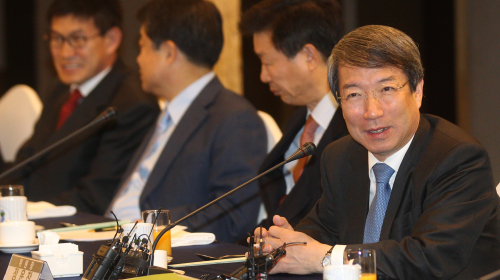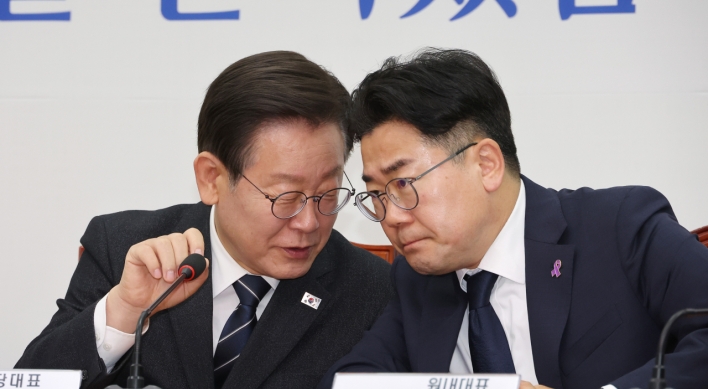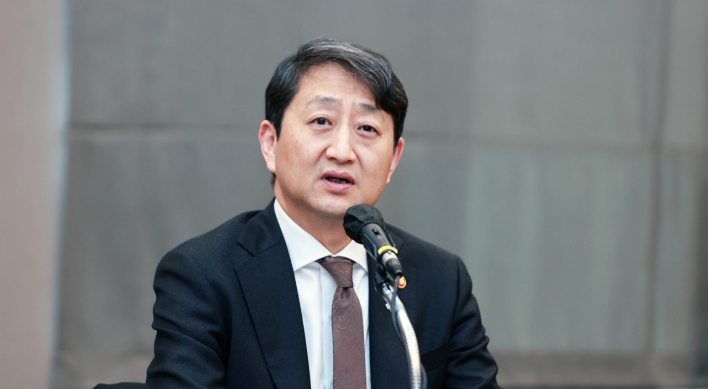[VOICE] Should big companies have to share profits?
By Korea HeraldPublished : Feb. 27, 2012 - 19:22
Should big companies have to share profits?
The concept of profit-sharing has been controversial since its announcement in early 2011 by Chung Un-chan, a former prime minister and current head of the Commission on Shared Growth for Large and Small Companies.
Chung, appointed by a President Lee Myung-bak desperate to shake off his pro-big business image, rankled conglomerates by proposing that some of their “excess” profits be directed toward the growth of small and medium-sized businesses. After complaints that the commission was trying to force profit-sharing, and a boycott of related negotiations by the Federation of Korean Industries, Chung and his colleagues earlier this month agreed on a watered-down system, renamed “cooperation benefit sharing.”
Under the system, which is voluntary unlike the earlier proposal, large companies may share their profits with suppliers based on prior agreements. The commission will then grade large companies on their support for smaller firms, with high-scoring companies benefiting from government incentives such as advantages in winning public orders. While avoiding the uproar of the initial proposal, big business representatives complained the measures were vague and agreed to without them. To many businesses and supporters of the free market, the idea of any such commission at all is worrisome.
Economic Reform Research Institute researcher Wi Pyoung-ryang, however, believes the commission is a necessary counter to chaebol dominance.
“Of course, the organization is positive and necessary in the Korean economic structure in order to narrow the profit gap between large and small companies, and revitalize small companies,” Wi told Voice.
While he “can’t judge” yet whether profit-sharing should be compulsory, Wi also believes that certain industries should be left to small and medium-sized businesses. As part of its mandate, the commission has “recommended” that conglomerates stay out of, or withdraw from, certain industries such as tofu and cardboard boxes.
“Some business territories should be left for small companies for short terms such as three-five years. With this, small companies can have their competitiveness,” said Wi.

Oh Jeong-suk of the Small & Medium Business Corporation said that small businesses are currently facing a number of stern challenges in the current environment.
“There are three different types of difficulty, one is the financial problem. The second is the lack of manpower. The third one is marketing. Korea’s market is so small and we have go abroad to sell our products,” said Oh, who stressed that he was speaking in a personal capacity only.
Accordingly, Oh believes that small companies need to be given a chance to grow out from the shadow of large conglomerates.
“Thing is, many chaebol dominate all our industry. It is such a big dominance compared to other nations so I think government will play a role in that,” said Oh, adding that he would support forced profit-sharing “if it is necessary.”
“The chaebol make some of sort of franchise … every corner, every street and they open a small bakery store and then they can be able to profit from them. So there is no place to go for small business owners and self-employed in these times; so the government has to get involved to balance small business and the chaebol.”
Those representing big businesses are less enthusiastic about being told in what areas they should or shouldn’t expand.
Industries suitable for SMEs may not be unilaterally designated, but refer to business sectors that SMEs have a competitive edge over large companies, for example, customized suits, house beer, special glass, special vehicles etc,” said a high-level source within FKI who did not wish named.
“In addition, suitability on the market is determined by consumers. As technology develops, an industry that used to be suitable for large companies can also turn into a field suitable for SMEs and vice versa. Therefore, it is impossible to say that some businesses are suitable only for large companies and others are only for SMEs.”
Kwon Hyuk-cheol, the head of the market economy research team at the Center for Free Enterprise in Seoul, said that consumers will suffer if businesses are restricted from certain industries.
“Regardless of big business or small business, the one that best serves the consumer will survive. If a big business offers a product at a cheap price, that is a big benefit for a consumer. In order for businesses to best serve the needs of the consumer, competition is by all means necessary,” he said.
Kwon also questions the common assumption that big business can only expand to the detriment of smaller players.
“People say that when a big business advances, a small business is bankrupted but that is only reporting one side. It is true that small business in direct competition with big business will face challenges. However, through such competition, a small business with a competitive edge will grow and develop.
Furthermore, the advantage of learning to reorganize resources for increased efficiency should not be overlooked,” he said.
While even the KFI said “that the Commission of Shared Growth will play an important role in enhancing competitiveness of domestic industries and in strengthening and developing the national economy for all Korean citizens,”
Kwon doesn’t believe it has any legitimate function.
“The presence and activities of the Commission on Shared Growth for Large and Small Companies are entirely unnecessary. Big and small businesses alike should voluntarily strive for their growth. To force businesses to grow is a laughable matter. I do not think the Commission on Shared Growth for Large and Small Companies is more interested in the growth and development of small businesses than that of the big businesses,” he said.
But moves to restrict the growth of conglomerates in favor of small businesses haven’t just come from the commission on shared growth. The Democratic United Party recently announced a plan to ban affiliates of the top 10 chaebol from making investments in companies above 40 percent of their worth.
Some, such as civic group Citizens’ Coalition for Economic Justice, even believe such measures should go further.
“Target companies should be large companies whose total assets are more than 5 trillion won,” said a spokeswoman for CCEJ who did not wish to be named.
“However, the DUP only argues about the top 10 conglomerates. Secondly, we also argue that the investment limit (be) 25 percent, which is also different from the DUP’s proposal. The DUP argues for 40 percent. We (also) strongly argue that cross-holding should be prohibited, we mean a total ban.”
Ultimately, the question of whether to intervene in the market can be about practicality as much as ideology. Yonsei School of Management professor Shin Dong-youb recognizes the merits of profit-sharing but wonders about its feasibility.
“Profit-sharing in this form has a lot good purposes but it has a lot problems too so it should be examined quite carefully because profit sharing asks companies to reduce their profits so that others, for example suppliers and smaller companies, can increase profits,” Shin said.
“The general purpose itself is good but the practical way to make this kind of thing is quite a tough challenge.”
By John Power (john.power@heraldcorp.com)
Readers’ Voice
On severance pay...
Severance pay is given to employees at the end of their employment. It has negative associations because it is normally given to people leaving work against their will. If pay is meant to be some kind of monetary compensation for unanticipated termination or untimely farewell, it is perfectly fine to call it severance pay. However, if not given for this reason, it may be better for employers to eschew the term.
For instance, when employees are supposed to get additional pay (over their annual salaries) for every year of service ― as is often the case in Korea ― then year-end bonus may be a more sensible term to use. Of course, employers can continue to label this severance pay or whatever term they like, even though it does not really make sense to insist on using the term.
Obviously, insisting on describing that kind of pay as severance is far from prudent. Thus, an insistence on sticking to the term could draw attention to the relatively short period of stability that comes with any kind of work with a year-to-year contract, while casting a shadow over job security as well. Incidentally, instability is off-putting for professional teachers, particularly those who are married or raising a family.
Most teachers of English and other foreign languages would understand that it is just another case of language being misunderstood and misused. They would also understand that employers do not intend to convey an unfavorable impression to prospective employees or accentuate the stereotype that teachers of foreign languages are glorified temps.
On the other hand, if the pay given annually is to be perceived as an incentive or reward for good work, the word “bonus” would help employees see this extra pay in a more positive light. Moreover, by shifting the focus from a point of separation to recognition of good work throughout the academic year, employers could help ensure that teachers do their best to the end as they would understand that it is not automatically given.
Perhaps, the aforementioned recommendation is not that helpful, if it is really compulsory pay that employers have to give in partnership with Sahakyeongeum (the Korea Teachers Pension). Those working at the private institutions are covered by this pension rather than the national pension that covers most of the working population in Korea.
For teachers, about 8.5 percent of monthly income is allocated as the teacher’s contribution. Given that there is no pay change during a 12-month period, the contributions end up being the same as a month’s salary at the end of a year of service, 8.5 times 12 being nearly 100. If a lump sum equal to a month’s pay is what native teachers of foreign languages are getting at the end of the year and for this very reason, then it needs to be made clearer, so that the teachers are better informed of their options.
It was a common practice to separately list severance pay and the institution’s pension contributions in job advertisements until recently. This practice did nothing but give the wrong impression. It largely amounted to a case of false advertising when both were in fact referring to the same allotment of pay. This misrepresentation has rarely been observed since fall 2011, a good sign of more honest advertising.
If an employer promises to provide severance pay plus pension contributions, it may good for prospective employees to specify in the contract. To my knowledge, the written contract supersedes the job advertisement; content in ads is apparently of no importance legally. Also, any verbal agreement made with or confirmation given by school representatives is of no value unless it can be proven in court. Thus, it is not a bad idea to ask the employer to be more specific in the contract, or put down what is left unspecified.
If the pay offered at the end of service is purely an additional allotment of pay with no strings attached, then employers could use a term such as “bonus”; if it has to do with pension contributions, then they ought to specify that in ads and contracts.
Job ads are no place for misinformation or ambiguity. Being typically the first point of contact with the employer, ads with erroneous information could weaken and even wreck the bond of trust over time. It is bad business practice for employers not to be straightforward, realistic and truthful.
Ads can provide a wonderful opportunity for employers to make an appealing case for their institution, and thereby attract competent teachers. While money is important, other factors such as workplace culture, management style and opportunities for professional development could easily come into play. Employers with a strong desire to hire the very best might want to highlight positive aspects in job ads.
― Shin C. Youngwan, Yangpyeong
On students’ rights...
Personally, I am so glad that we finally have such an innovative ordinance that will hopefully enhance our students’ rights in and out of school settings. However, the problem is, I think, that people directly involved ― including parents, teachers and even our students ― aren’t really sure about how ready they are for such progressive change!
― Jimmy Sangjin Kim, Victoria, Canada
-
Articles by Korea Herald



![[AtoZ Korean Mind] Does your job define who you are? Should it?](http://res.heraldm.com/phpwas/restmb_idxmake.php?idx=644&simg=/content/image/2024/05/06/20240506050099_0.jpg&u=)















![[K-pop's dilemma] Is Hybe-Ador conflict a case of growing pains?](http://res.heraldm.com/phpwas/restmb_idxmake.php?idx=642&simg=/content/image/2024/05/07/20240507050746_0.jpg&u=)